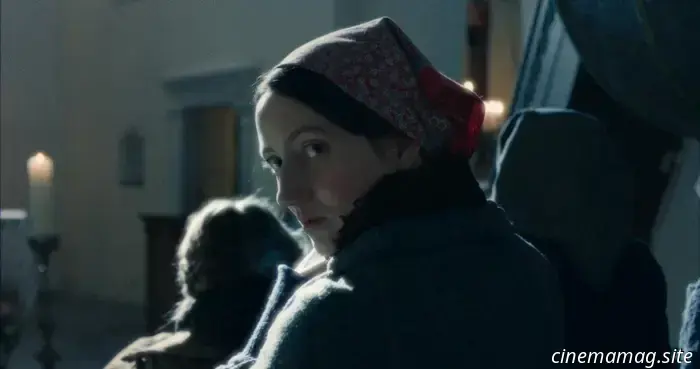
Cannes Review: Sentimental Value Flourishes Through the Unique Chemistry of Joachim Trier and Renate Reinsve
In a carefully arranged, Mike Mills-esque montage detailing Nora Berg’s (Renate Reinsve) personal history––over three decades of an Oslo local's life conveyed through a brief assembly of major moments, emotions, and thoughts, intertwined with the lives and traits of those before her––the wise voice of her grandmother introduces us to Sentimental Value, Joachim Trier’s intergenerational drama centered on working through (if not mending) familial trauma via art.
The Norwegian director, who gained international acclaim with his fifth and most expressive film to date, The Worst Person in the World, possesses a distinctive talent for unraveling the shame, bitterness, and specific psychological burdens passed down by parents and inherited by their children. With Value, he scales back on stylistic embellishments, removing the flair and energy that characterized Worst Person to probe the inner lives of both the individual and the broader family unit with unwavering honesty.
Gustav Borg (Stellan Skarsgård) embodies the kind of father who leaves his family to pursue a filmmaking career when his daughters are young and most in need of him. As an absent grandfather, he’s the type to give his 10-year-old grandson DVD copies of Irréversible and The Piano Teacher, intending to teach him everything there is to know about women. (His laughter implies it’s somewhat of a joke, but he also seems to mean it.) This marks Sentimental Value's second nod to Haneke, following a noticeable crack in the drywall––a replica of the Caché poster tear that cleverly represented the depraved voyeurism central to Haneke’s incisive cinematic work––serving as the backdrop for the title card. The thematic connection is felt as soon as Gustav and Nora meet again.
Gustav also embodies the unabashed type of Royal Tenenbaum who reemerges with a brilliant but self-centered idea. To revive his dwindling career, he has scripted a comeback project for himself to direct: a candid portrayal of his mother’s tragic life, which unfolded in the very house where both Gustav and his daughters grew up. (The traumatic experiences she endured under Nazi rule never left her.) To make his request even more inappropriate, he wants Nora––who has never acted in his films––to portray his mother, a twisted, voyeuristic demand from a man who has distanced himself from witnessing his own daughter's upbringing.
While somewhat treading in her father's footsteps but striving to forge her own path, Nora is an acclaimed theater performer who has achieved parallel success in television while completely steering clear of the film industry. Her sister Agnes (Inga Ibsdotter Lilleaas) did not chase an acting career but is recognized by Borg enthusiasts as the little girl featured in the final shot of one of his most famous films, a tense escape scene from a concentration camp presented mid-film without the surrounding context.
Nora doesn’t hesitate. “No.” She hasn’t seen her father in years, and his return following the death of their mother is unwelcome. The situation worsens when they discover that Gustav still owns the house and plans to utilize it for the film. The initial assumption, which is justified, is that Gustav's only agenda is self-promotion––that he will once more cast aside his daughter as soon as the project concludes and he is back in the limelight. However, Trier’s skillful unveiling of the family history reveals a vastly different narrative: a dense emotional journey exploring the complexities between the daughters, their father, and their shared heritage.
Being the professional he is, Borg does not push the issue. Instead, he accepts her refusal, honors his daughter's boundaries, and––much to Nora’s reluctant, concealed displeasure––casts A-lister Rachel Kemp (Elle Fanning, providing a beautifully nuanced portrayal of an artist-celebrity navigating the development of a character for a heavy, dramatic role). Whether she will set aside her pride and engage with her father’s project (if that’s even an option) or leave things unresolved becomes the film's central tension, culminating in a justified response to her abandonment.
As is customary with Trier’s films, Sentimental Value is co-written by Eskil Vogt. Their screenplay captivates by drawing audiences to something so ordinary, never saying too little nor too much. It’s a dialogue-heavy film; while that is often not a compliment, here, the conversations are delightful, potentially aiding any viewer in unpacking their own familial trauma. In fact, the discussions could continue much longer. The characters are well-developed, the dialogue feels authentic, and the backstories and present narratives are compelling. Their exchanges feel less like scripted dialogue and more like genuine moments fortuitously captured.
In creating a relatively small yet impactful film, Trier demonstrates a mastery that belongs to a young veteran at the peak of his career. A light, ethereal score from Hania Rani and graceful cinematography from DP Kasper Tuxen narrate the story. Each frame and composed

Other articles
 Debuting on Streaming: Vermiglio, Mickey 17, The Legend of Ochi, The Black Sea, and More
Every week, we showcase the significant titles that have recently become available on streaming platforms in the United States. Take a look at this week's picks below and explore previous compilations here. The Black Sea (Crystal Moselle and Derrick B. Harden) Throughout much of its duration, Crystal Moselle and Derrick B. Harden’s documentary-style hybrid The Black Sea balances on the brink of
Debuting on Streaming: Vermiglio, Mickey 17, The Legend of Ochi, The Black Sea, and More
Every week, we showcase the significant titles that have recently become available on streaming platforms in the United States. Take a look at this week's picks below and explore previous compilations here. The Black Sea (Crystal Moselle and Derrick B. Harden) Throughout much of its duration, Crystal Moselle and Derrick B. Harden’s documentary-style hybrid The Black Sea balances on the brink of
 Sherlock Holmes Untold will be released in October by Big Finish.
Big Finish has revealed that a brand-new audio drama series featuring Sherlock Holmes will be released this October. The upcoming Sherlock Holmes Untold will showcase Sir Arthur Conan Doyle’s brilliant detective tackling fresh obstacles and formidable foes. This new series will consist of eight half-hour episodes, released as downloadable installments each week.
Sherlock Holmes Untold will be released in October by Big Finish.
Big Finish has revealed that a brand-new audio drama series featuring Sherlock Holmes will be released this October. The upcoming Sherlock Holmes Untold will showcase Sir Arthur Conan Doyle’s brilliant detective tackling fresh obstacles and formidable foes. This new series will consist of eight half-hour episodes, released as downloadable installments each week.
 Netflix's Kpop Demon Hunters reveals a trailer, poster, and images.
Netflix has unveiled a trailer, poster, and images for "Kpop Demon Hunters," an anticipated animated action fantasy directed by Maggie Kang and Chris Appelhans. The story follows a top K-pop girl group that utilizes their secret identities to shield their fans from supernatural dangers. Take a look at them here… When they're not performing to packed arenas, K-pop icons Rumi, […]
Netflix's Kpop Demon Hunters reveals a trailer, poster, and images.
Netflix has unveiled a trailer, poster, and images for "Kpop Demon Hunters," an anticipated animated action fantasy directed by Maggie Kang and Chris Appelhans. The story follows a top K-pop girl group that utilizes their secret identities to shield their fans from supernatural dangers. Take a look at them here… When they're not performing to packed arenas, K-pop icons Rumi, […]
 The Ten Commandments of '80s Films
Here are the 10 Commandments of '80s films, featuring Honor Thy Father and Mother Even If They Are Not as Intelligent as You.
The Ten Commandments of '80s Films
Here are the 10 Commandments of '80s films, featuring Honor Thy Father and Mother Even If They Are Not as Intelligent as You.
 NYC Weekend Preview: Ran, Prime Cut, Police Story, and More
NYC Weekend Watch is our weekly summary of repertory screenings. IFC Center is showcasing a 40th-anniversary restoration of Ran; Goodfellas and Withnail and I are shown daily; Wanda is scheduled for Friday and Sunday, while Children of Men will be screened on Friday; late showings include To Live and Die in L.A., Brain Damage, In the Realm of the Senses, and Liquid Sky. Roxy Cinema is presenting Paranormal Activity on 35mm this week.
NYC Weekend Preview: Ran, Prime Cut, Police Story, and More
NYC Weekend Watch is our weekly summary of repertory screenings. IFC Center is showcasing a 40th-anniversary restoration of Ran; Goodfellas and Withnail and I are shown daily; Wanda is scheduled for Friday and Sunday, while Children of Men will be screened on Friday; late showings include To Live and Die in L.A., Brain Damage, In the Realm of the Senses, and Liquid Sky. Roxy Cinema is presenting Paranormal Activity on 35mm this week.
 Mighty Morphin Power Rangers: Rita's Rewind comic tie-in set to be released in August.
Boom! Studios has revealed that the side-scrolling beat ’em up video game Mighty Morphin Power Rangers: Rita’s Rewind will be accompanied by a comic book tie-in. Writer Zoe Tunnell (Godzilla: Valentine’s Day Special) and artist Tango (Teenage Mutant Ninja Turtles: Saturday Morning Adventures) will collaborate on a one-shot comic of the same title. Rita Repulsa has teamed [...]
Mighty Morphin Power Rangers: Rita's Rewind comic tie-in set to be released in August.
Boom! Studios has revealed that the side-scrolling beat ’em up video game Mighty Morphin Power Rangers: Rita’s Rewind will be accompanied by a comic book tie-in. Writer Zoe Tunnell (Godzilla: Valentine’s Day Special) and artist Tango (Teenage Mutant Ninja Turtles: Saturday Morning Adventures) will collaborate on a one-shot comic of the same title. Rita Repulsa has teamed [...]
Cannes Review: Sentimental Value Flourishes Through the Unique Chemistry of Joachim Trier and Renate Reinsve
Through a carefully crafted montage reminiscent of Mike Mills, we explore the personal history of Nora Berg (Renate Reinsve), encapsulating around 30 years of an Oslo native's life through select key moments, emotions, and reflections, intertwined with the lives and traits of those who came before her. A grandmother's wise voice guides us into "Sentimental Value," a film by Joachim Trier.
